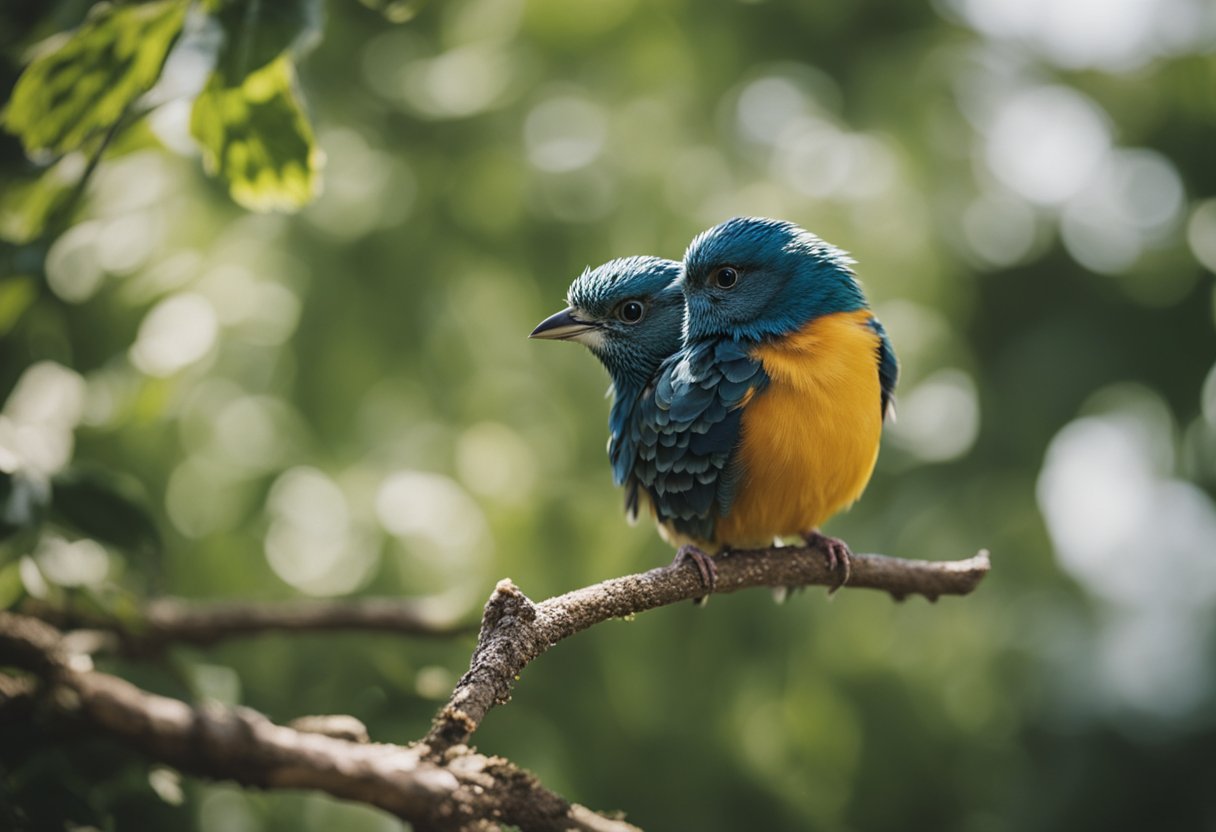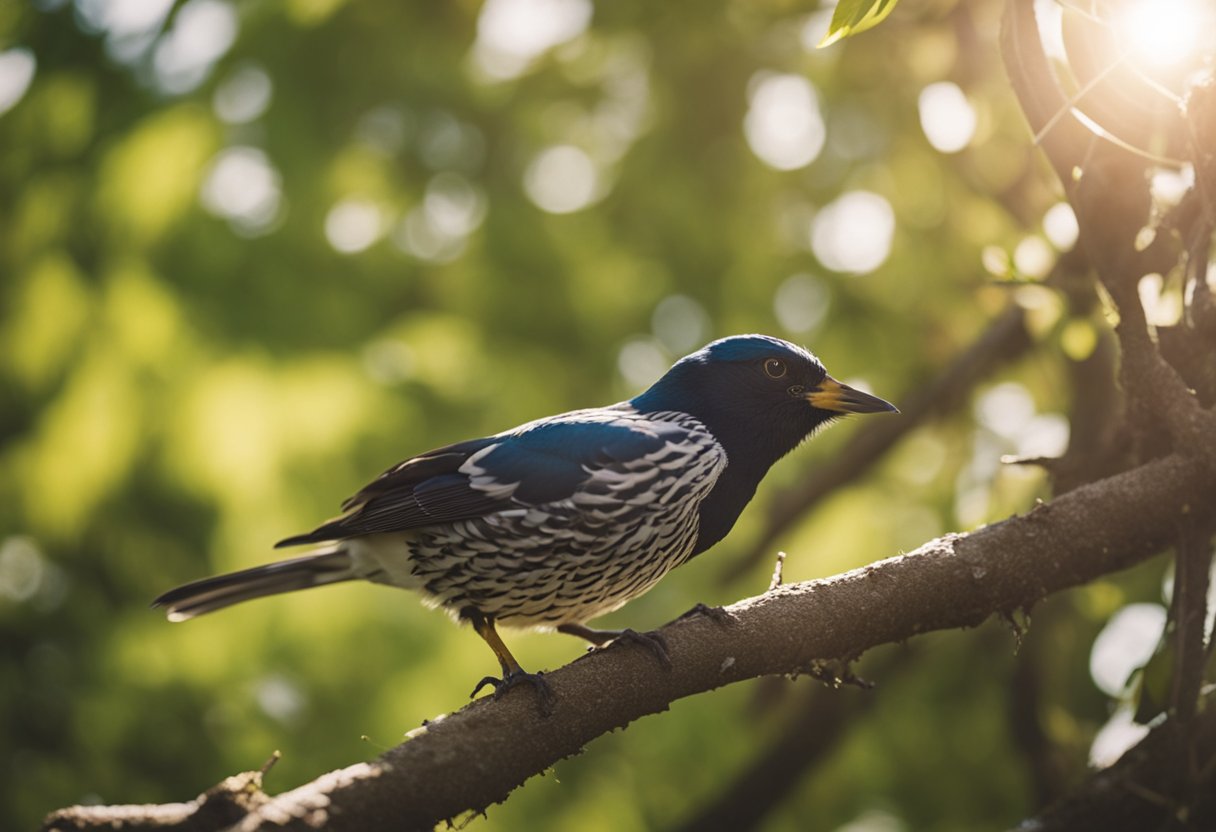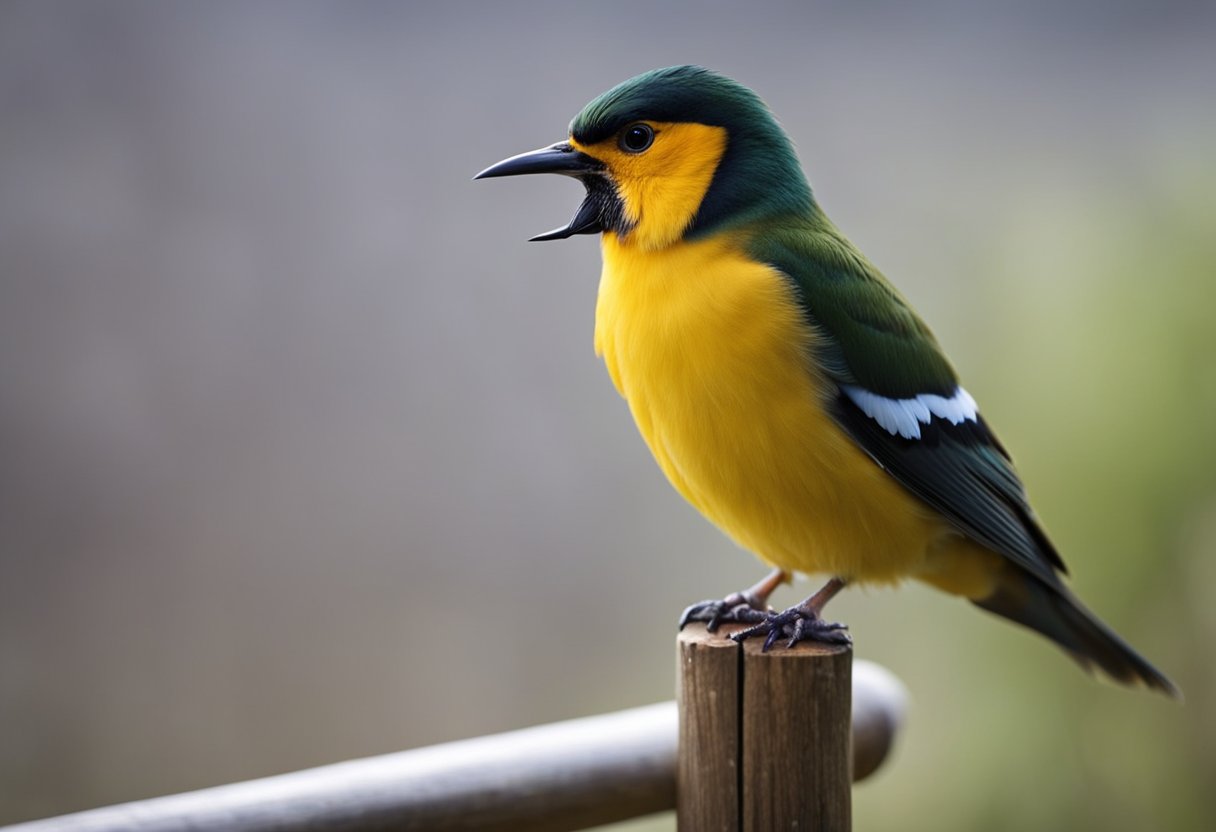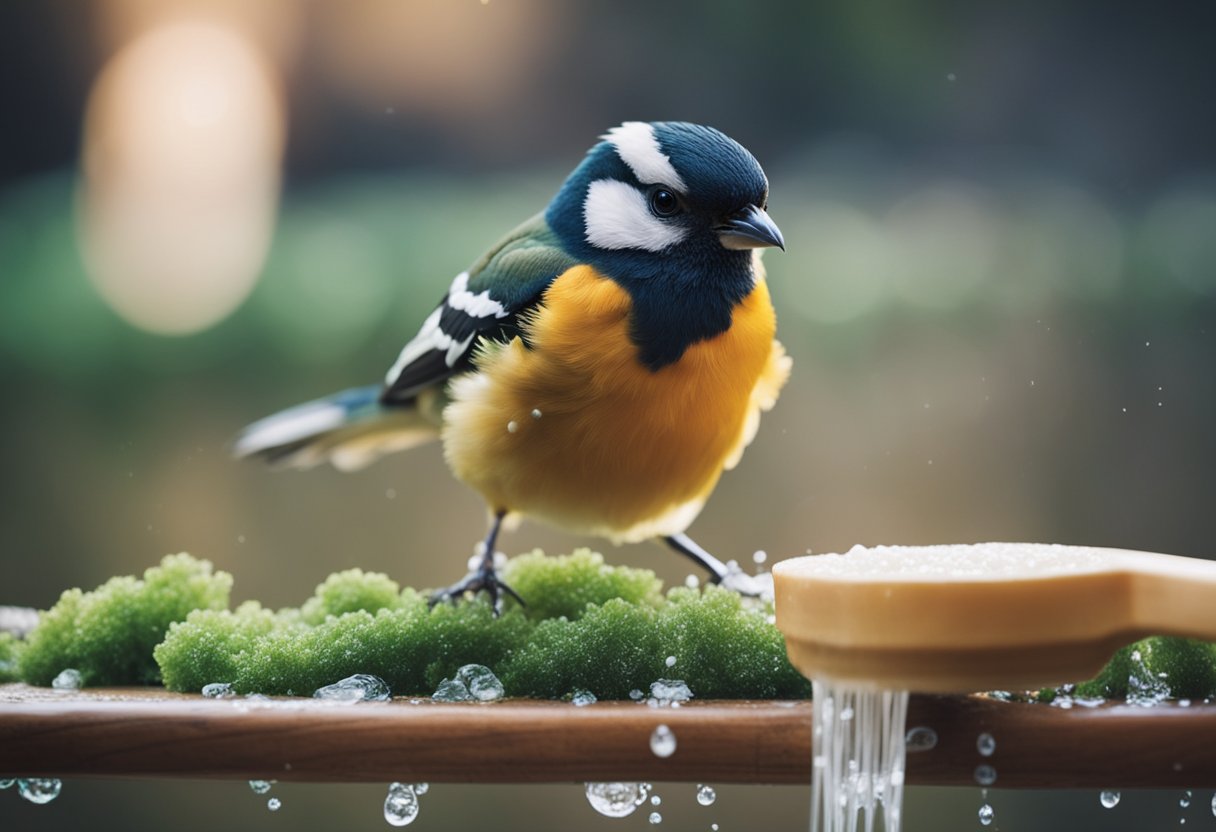Cleaning bird perches is an essential part of maintaining a healthy and comfortable environment for your feathered friend. Dirty perches can harbor bacteria, fungi, and parasites that can lead to infections and illnesses. Moreover, dirty perches can cause discomfort to birds, leading to stress and behavioral problems. Therefore, it is crucial to clean bird perches regularly.

Understanding the importance of clean perches is the first step towards achieving a healthy and happy bird. Different types of bird perches have different cleaning needs, and you need to prepare adequately before cleaning. In this article, I will guide you through the step-by-step process of cleaning bird perches, including drying and inspecting them. I will also provide tips on maintaining perch hygiene and comfort, as well as potential risks and safety measures to consider.
Key Takeaways
- Clean perches are essential for maintaining a healthy and comfortable environment for birds.
- Different types of bird perches have different cleaning needs, and preparation is crucial before cleaning.
- Regular cleaning, drying, and inspection of perches, as well as proper maintenance, can help prevent infections and illnesses.
Understanding the Importance of Clean Perches
As a bird owner, I understand the importance of maintaining a clean and healthy environment for my feathered friend. One of the most important aspects of bird care is keeping their perches clean. Dirty perches can harbor harmful bacteria and fungi, which can lead to infections and other health problems.
Birds spend a lot of time on their perches, and as a result, they can become a breeding ground for bacteria and other pathogens. These pathogens can cause a variety of health problems, including respiratory infections, skin irritations, and digestive issues. Regular cleaning of perches can help prevent the growth of bacteria and fungi, and keep your bird healthy and happy.
It is essential to maintain good hygiene when it comes to cleaning bird perches. You should always wash your hands before and after handling your bird and their perches. This will help prevent the spread of any harmful bacteria or fungi that may be present on the perches.
The frequency of cleaning your bird’s perches will depend on the type of perch and how many birds you have. Wooden perches should be cleaned at least once a week, while rope perches should be cleaned every other day. Plastic perches can be wiped down with a damp cloth as needed.
In conclusion, keeping your bird’s perches clean is an essential part of bird care. Regular cleaning can prevent the growth of harmful bacteria and fungi, and help keep your bird healthy and happy. By maintaining good hygiene and cleaning your bird’s perches regularly, you can ensure that your feathered friend stays healthy and happy.
Types of Bird Perches and Their Cleaning Needs
As a bird owner, it is essential to understand the different types of perches available and their cleaning needs. Here are some of the most common types of bird perches and how to clean them:
Wooden Bird Perches
Wooden bird perches are a popular choice for bird owners because they mimic the natural environment of birds. However, wooden perches can be challenging to clean due to their porous nature. To clean a wooden perch, use a soft cloth and warm soapy water. You may also use vinegar or baking soda to disinfect the perch. Make sure to dry the perch thoroughly before returning it to the cage.
Rope Bird Perches
Rope bird perches are a comfortable and flexible option for birds. However, they can be challenging to clean due to their texture. To clean a rope perch, use a scrub brush or sponge, warm soapy water, and sandpaper for stubborn stains. You may also use a bird-safe disinfectant made of water and apple cider vinegar to clean the perch.
Cement Bird Perches
Cement perches are a popular choice for bird owners because they help to keep the bird’s nails trimmed. To clean a cement perch, use warm soapy water and a scrub brush or sponge. You may also use a bird-safe disinfectant to clean the perch. Make sure to dry the perch thoroughly before returning it to the cage.
Natural Wood Perches
Natural wood perches are another popular choice for bird owners because they mimic the natural environment of birds. To clean a natural wood perch, use warm soapy water and a soft cloth. You may also use vinegar or baking soda to disinfect the perch. Make sure to dry the perch thoroughly before returning it to the cage.
In conclusion, understanding the different types of bird perches and their cleaning needs is essential for maintaining your bird’s health and hygiene. By following the proper cleaning methods, you can ensure that your bird’s perches are clean and safe.
Preparation for Cleaning Bird Perches
Cleaning bird perches is an important part of maintaining your feathered friend’s health and hygiene. Before you start cleaning, there are a few things you need to prepare for a safe and effective cleaning process.
Gloves
Wearing gloves is important when cleaning bird perches. Not only does this protect your hands from germs and bacteria, but it also prevents the transfer of oils and other substances from your skin to the perch. This is especially important if you have wooden perches, as the oils from your skin can damage the wood over time.
Cleaning Solution
There are several cleaning solutions you can use to clean bird perches. Dish soap or mild soap and water are effective options for routine cleaning. You can also use a diluted bleach solution or white vinegar to disinfect the perches. However, it’s important to note that bleach is more intoxicating to birds than vinegar, so use it sparingly and ensure that the perch is thoroughly rinsed before returning it to the cage.
Scrub Brush
A scrub brush or sponge is necessary for removing debris and droppings from the perch. Choose a brush or sponge with soft bristles to avoid damaging the perch. You can also use sandpaper for wooden perches to remove any rough spots or stains.
Drying Materials
After cleaning, it’s important to dry the perch thoroughly before returning it to the cage. You can use paper towels or newspaper to absorb excess moisture. Alternatively, you can let the perch air dry in a sunny spot to speed up the drying process.
By preparing these materials before cleaning, you can ensure a safe and effective cleaning process for your bird’s perches.
Step by Step Guide to Clean Bird Perches
Cleaning bird perches is an essential task to maintain the hygiene and health of your pet birds. Here is a step-by-step guide on how to clean bird perches effectively:
-
Remove the Perch from the Cage: Start by removing the bird perch from the cage. This will make it easier to clean and prevent any mess from falling into the cage.
-
Scrub with Hot Water and Soap: Scrub the bird perch with hot water and soap. You can use a handheld steamer or a manual brush to scrub the bird perch thoroughly. For wooden perches, you can use sandpaper to remove any stubborn dirt or stains.
-
Soak in Vinegar Solution: Soak the bird perch in a vinegar solution for 10-15 minutes. This will disinfect the perch and kill any bacteria or germs. For rope perches, you can use a mild detergent instead of vinegar.
-
Rinse Thoroughly: Rinse the bird perch thoroughly with hot water to remove any soap or vinegar residue. Make sure to rinse the perch well, as any residue can be harmful to your pet bird.
-
Dry the Perch: After rinsing, dry the bird perch with a clean towel or let it air dry. Make sure the perch is completely dry before placing it back in the cage.
-
Spot Clean Regularly: It’s important to spot clean the bird perch regularly to prevent any buildup of dirt or bacteria. You can use a cage cleaner or a solution of hot water and vinegar to spot clean the perch.
-
Clean Perches Regularly: It’s recommended to clean bird perches at least once a week to maintain their hygiene and health. You can also clean perches in a washing machine or with a power washer, but make sure to follow the manufacturer’s instructions.
By following these simple steps, you can keep your bird perches clean and your pet birds healthy and happy.
Drying and Inspecting Perches

Once you have cleaned your bird perches, it is important to dry them completely before returning them to the cage. Any moisture left on the perch can lead to the growth of harmful bacteria or fungi. You can use a soft cloth, paper towels, or even a hairdryer on a low setting to dry the perches thoroughly.
Inspect each perch carefully after it has dried to ensure that there are no splinters, cracks, or other damage that could harm your bird. If you find any damage, discard the perch immediately and replace it with a new one.
Additionally, check for any frayed or loose threads on rope perches. If you find any, trim them off with scissors to prevent your bird from getting tangled or injured.
Avoid using sponges to dry your bird perches, as they can harbor bacteria and other harmful microorganisms. Instead, use paper towels or a soft cloth that you can wash and sanitize after each use.
By taking the time to dry and inspect your bird perches, you can ensure that your feathered friend has a safe and healthy environment to live in.
Maintaining Perch Hygiene and Comfort
As a bird owner, it is essential to maintain proper hygiene of the bird perches. Clean perches provide a comfortable and healthy environment for your bird. To maintain perch hygiene, I recommend disinfecting and wiping down perches with a damp cloth regularly.
Sanitizing perches is also important to prevent bacterial growth and maintain a healthy environment. For wooden perches, I suggest soaking them in a mixture of water and apple cider vinegar for at least an hour and then rinsing them thoroughly. Vinegar is an excellent disinfectant and helps remove dirt and bacteria from the perch’s surface.
When selecting perches, it is important to consider your bird’s comfort. Birds spend a lot of time on their perches, so it is crucial to select perches that are comfortable and safe for their feet. Perches should have a comfortable grip and be of appropriate size and diameter for your bird’s feet.
Perches with different textures can also provide your bird with exercise and exploration opportunities. Birds enjoy exploring different textures and materials. However, it is important to ensure that the texture of the perch is not too rough and does not damage your bird’s feathers or skin.
Improperly sized or textured perches can cause joint pain and foot health issues in birds. Birds with joint pain or foot health issues may have difficulty perching, which can affect their behavior and overall health. Therefore, it is important to select perches that are appropriate for your bird’s size and health needs.
In summary, maintaining proper hygiene and comfort of bird perches is essential for your bird’s health and well-being. Disinfecting and sanitizing perches regularly, selecting comfortable and appropriately sized perches, and providing perches with different textures can all contribute to a healthy and happy bird.
Potential Risks and Safety Measures

As a bird owner, it is essential to maintain your bird’s health and hygiene by ensuring that their perches are clean and safe. However, it is equally important to be aware of the potential risks associated with cleaning bird perches and to take appropriate safety measures.
One of the potential risks of cleaning bird perches is the use of toxic cleaning agents. It is crucial to avoid using any harsh chemicals or disinfectants that may harm your bird’s health. Instead, opt for natural disinfectant options such as apple cider vinegar or baking soda, which are safe and effective.
Another risk is the use of sandpaper on perches. Sandpaper can be harmful to your bird’s feet and beak, causing injuries and infections. Instead, use natural branches or perches made of safe materials such as wood or rope.
When cleaning bird perches, it is also essential to ensure that the bird cage is secure and that your bird is not in the cage. This will prevent any accidents or injuries to your bird.
Lastly, it is important to provide your bird with entertainment options such as toys or swings to keep them occupied while you clean their perches. This will prevent boredom and stress, which can lead to health problems.
In summary, when cleaning bird perches, it is crucial to use safe and natural disinfectant options, avoid sandpaper, ensure that your bird is not in the cage, and provide entertainment options to prevent boredom and stress. By taking these safety measures, you can maintain your bird’s health and hygiene and ensure that they are happy and healthy.
The Role of Perches in Bird’s Life

As a bird owner, I understand the importance of providing my feathered friend with a clean and comfortable living space. One of the most essential components of a bird’s environment is the perch. Perches serve many purposes in a bird’s life, from providing a place to rest to promoting play and exercise.
One of the primary functions of perches is to provide birds with a place to rest and sleep. When birds sleep, they often tuck their beaks into their feathers and stand on one leg, using the other leg to balance on the perch. This resting position helps birds conserve energy and stay warm. Therefore, it’s essential to provide your bird with a comfortable perch to rest on.
Perches also play a crucial role in a bird’s play and exercise routine. Birds love to climb, swing, and play on their perches. Therefore, it’s essential to provide your bird with a variety of perches of different shapes, sizes, and textures to keep them entertained and engaged. This variety will also help promote exercise and prevent boredom.
When it comes to nutrition, perches can play a role in a bird’s diet. Some bird owners provide their birds with mineral perches, which contain minerals and trace elements that are essential for a bird’s health. These perches can help supplement a bird’s diet and provide additional nutrition.
However, it’s important to note that bird droppings can accumulate on perches, making them dirty and unsanitary. Therefore, it’s crucial to clean perches regularly to prevent the buildup of bacteria and other harmful substances that can harm your bird’s health.
In summary, perches play a vital role in a bird’s life, providing a place to rest, play, and exercise. As a bird owner, it’s important to provide your bird with a variety of perches of different shapes, sizes, and textures, as well as to keep them clean and sanitary. By doing so, you can help ensure your bird’s health and happiness.
Frequently Asked Questions

What is the best way to clean bird perches?
The best way to clean bird perches is to first remove them from the cage and shake off any loose debris. Next, use a soft brush or sponge to scrub off any remaining dirt or droppings. For wooden perches, use a damp cloth to wipe away any remaining residue. If necessary, use a scrub brush and soapy water to remove stubborn buildup. For rope perches, use a mild soap and water solution to clean the rope. Rinse the perch thoroughly and dry it completely before returning it to the cage.
How do you disinfect bird branches?
To disinfect bird branches, you can use a solution of water and vinegar or bleach. Mix one part vinegar or bleach to three parts water and soak the branch in the solution for 10-15 minutes. Rinse the branch thoroughly with water and dry it completely before returning it to the cage.
Can vinegar be used to clean bird cages?
Yes, vinegar can be used to clean bird cages. Mix equal parts water and vinegar in a spray bottle and use it to clean the cage bars, perches, and toys. Be sure to rinse everything thoroughly with water and dry it completely before returning it to the cage.
What is the process for cleaning wooden bird toys?
The process for cleaning wooden bird toys is similar to cleaning bird perches. Use a soft brush or sponge to scrub off any dirt or droppings, and wipe away any remaining residue with a damp cloth. If necessary, use a scrub brush and soapy water to remove stubborn buildup. Rinse the toy thoroughly and dry it completely before returning it to the cage.
How can you treat wood for bird perches?
To treat wood for bird perches, you can use a bird-safe sealant or varnish. Be sure to choose a product that is non-toxic and safe for birds. Apply the sealant or varnish according to the manufacturer’s instructions and allow it to dry completely before using the perch.
How often should bird perches be cleaned?
Bird perches should be cleaned on a regular basis, ideally every day or every other day. However, the frequency of cleaning may depend on the number of birds in the cage and how often they use the perches. It’s important to monitor the perches for any signs of dirt or droppings and clean them as needed to maintain a clean and healthy environment for your birds.

Hi, I’m Sal Muller of Tooltrip.com. My DIY experience led me to understand essential power tools for home projects. Tooltrip.com guides enthusiasts and professionals in choosing right tools for any job. I provide concise top tool reviews for easier, efficient DIY.

